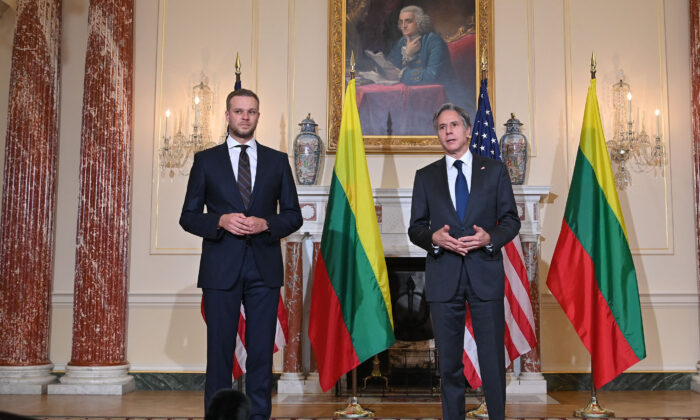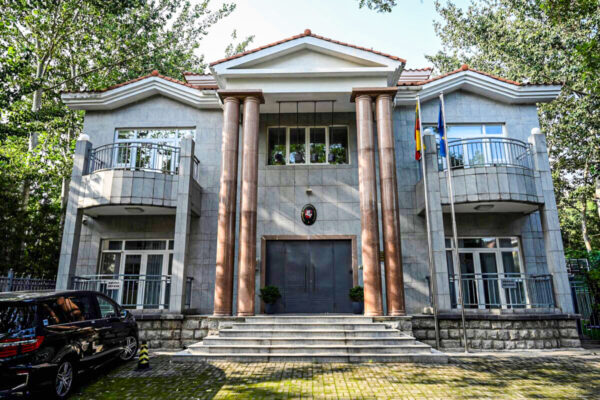 U.S. Secretary of State Antony Blinken (right) speaks with Lithuania’s Foreign Minister Gabrielius Landsbergis in the Benjamin Franklin Room of the State Department ahead of a meeting in Washington, on Sept. 15, 2021. (Mandel Ngan/Pool/AFP via Getty Images)
China’s Economic Attack on Lithuania Requires a Joint US-EU Defense
Beijing is also targeting Germany, France, and Sweden
U.S. Secretary of State Antony Blinken (right) speaks with Lithuania’s Foreign Minister Gabrielius Landsbergis in the Benjamin Franklin Room of the State Department ahead of a meeting in Washington, on Sept. 15, 2021. (Mandel Ngan/Pool/AFP via Getty Images)
China’s Economic Attack on Lithuania Requires a Joint US-EU Defense
Beijing is also targeting Germany, France, and Sweden
Anders Corr
December 21, 2021
Epoch Times News Analysis Audio PDF
Beijing has reacted against
Lithuania’s upgrade to its
Taiwan relations with extended trade and diplomatic sanctions against the Baltic country. The move is so severe and unprecedented that it provoked
reactions from not only the
United States, Britain, and European Union, but a German business group that has deep financial ties to China.
Behind the uproar was Lithuania’s courageous
decision in November to allow Taiwan to open a de facto consulate in Lithuania’s capital city of Vilnius. The office
uses the name “Taiwan” rather than Taiwan’s capital city of “Taipei.” The former more accurately reflects the island democracy’s sovereignty than the “Taipei” used in the United States and elsewhere in Europe.
Last year, Lithuania
withdrew from China’s “17+1” diplomatic forum of Central and East European countries, and Lithuania’s ruling coalition
agreed to support “those fighting for freedom” in Taiwan.
Lithuanian Foreign Minister Gabrielius Landsbergis
said he will not attend the Beijing Winter Olympics.
Lithuania, a country of nearly 3 million, regained its independence from the Soviet Union in 1990, which in part explains the country’s fierce defense of democracy relative to most of the rest of the world.
Beijing’s Backlash Against Lithuania
In response to Lithuania’s growing resistance, Beijing effectively
banned imports from the Baltic country on Dec. 1, and demanded that international corporations sever ties with Lithuania or be denied access to the Chinese market.
The Chinese Communist Party (CCP)
expelled Lithuania’s ambassador to China in November, withdrew its own from Vilnius, and recently attempted to illegally downgrade the Lithuanian Embassy in Beijing.
According to
Bloomberg, “China had pressured the Baltic nation to change its embassy’s name to the Office of the Charge d‘Affaires, according to Lithuania’s Foreign Ministry, a label that doesn’t exist in international law and one that would effectively downgrade its diplomatic status.”
Landsbergis said: “This is still our embassy, which has never changed its name. Any change of name must be done on [a] bilateral basis. Unilateral changes are not recognized by international law.”
Beijing most recently demanded that Lithuanian diplomats
return their identification cards.
Alarmed at their possible loss of diplomatic immunity and concerned for their safety, Lithuania recalled its diplomats from China on
Dec. 15 for consultations.
Nineteen of them and their dependents consequently departed. The embassy now works virtually.

The Lithuanian Embassy in Beijing, China, on Aug. 10, 2021. (Jade Gao/AFP via Getty Images)
According to
Arnoldas Pranckevičius, Lithuania’s vice minister of Foreign Affairs, “China is trying to make an example out of us—a negative example—so that other countries do not follow our path. Therefore, it is a matter of principle how the Western community, the United States, and European Union react.”
Support for Lithuania Is Growing Too Slowly
The United States,
Britain,
Estonia, and of course Taiwan have all supported Lithuania in its dispute with China. But, so far, the EU has
reacted only weakly, in large part due to Germany and France’s economic ties with China, and apparent reluctance to use the bloc in defense of Europe’s smaller countries.
In response to Beijing’s economic sanctions against Lithuania, the EU began gathering evidence to bring China to the World Trade Organization (WTO) for violation of international trade rules, but that could take months.
And the WTO effort could eventually be scuttled, as some companies will not want Brussels to take strong action against Beijing. According to the Financial Times, “many companies fear that if they complain they will be shut out of China completely.”
Beijing Doubles Down Against Lithuania
China’s nationalist media has weighed in on the dispute. According to the state-controlled
Global Times tabloid, “we have no intention to deny that economic and trade cooperation between Lithuania and China will be affected after China downgraded its diplomatic relations with Lithuania to the level of chargé d’affaires, the lowest rank of diplomatic representative, over the latter’s breach of the One-China principle. Make no mistake that any country that provokes China’s core interests is bound to find itself on the receiving end of countermeasures.”
Beijing’s reaction could have been worse. In 2018, Beijing effectively
kidnapped two prominent Canadians to pressure the North American country over the detention of Meng Wanzhou, the chief financial officer of Chinese tech giant Huawei. The two Canadians, Michael Kovrig and Michael Spavor, were kept in harsh conditions for over 1,000 days, until Meng was returned to China.

(L-R) Michael Spavor and Michael Kovrig, two Canadians who were detained in China following the arrest of Meng Wanzhou in Canada on a U.S. extradition request. (AP Photo)
Over this time, Beijing lied about there being no relationship between the detention of the “two Michaels” and the Meng arrest. Yet Spavor and Kovrig were arrested, and released, within days of the same happening to Meng.
The Chinese regime has likewise denied pressuring international corporations to sever ties with Lithuania, but has indicated as much by saying that Chinese companies no longer trust Lithuania.
“I heard that many Chinese companies no longer regard Lithuania as a trustworthy partner,” a Chinese foreign ministry spokesperson said. “Lithuania has to look at itself for the reason why Lithuanian companies are facing difficulties in trade and economic cooperation in China.”
Beijing Extends Sanctions to Germany, France, and
Sweden
The CCP’s trade sanctions have quietly extended to pressure German, French, and Swedish companies with supply chains that reach Lithuania.
According to
Politico sources, “two German companies in the auto industry had parts stopped at Chinese ports in recent days because they were manufactured in Lithuania. Some of these components could take years to be replaced with trusted alternative suppliers. … French and Swedish firms are also reportedly facing similar problems because Lithuanian products form part of their supply chain.”
Consequently, some international companies have
canceled contracts with Lithuanian suppliers.
Over the longer term, others will increasingly reevaluate the wisdom of relying on Chinese markets and manufacturing.
The Lithuanian Embassy in Beijing, China, on Aug. 10, 2021. (Jade Gao/AFP via Getty Images)
(L-R) Michael Spavor and Michael Kovrig, two Canadians who were detained in China following the arrest of Meng Wanzhou in Canada on a U.S. extradition request. (AP Photo)

